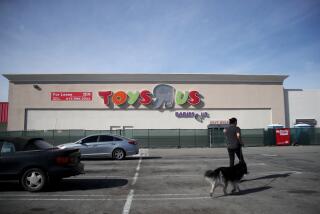Tinkertoy Capitalism Won’t Fade Away
- Share via
You’re bound to be perplexed by today’s business news. A group of investors wants to buy RJR Nabisco for $20.6 billion. Philip Morris is acquiring Kraft for $12.9 billion. Corporate takeovers are thriving. But what’s really going on here?
Call it Tinkertoy capitalism. Many companies are collections of huge businesses that can be put together or taken apart, like so many Tinkertoys, for profit and power. This is nothing new. Between 1963 and 1987 there were 74,000 mergers, takeovers, buyouts and spin-offs worth more than $1.2 trillion, reports W. T. Grimm & Co. The basic rule of thumb about takeovers is that there’s no simple answer to the most obvious question: Are they good or bad?
Some takeovers create more productive and competitive companies. But many takeovers don’t. Results differ, because the motives behind takeovers vary. Corporate managers often try to maximize company size, not efficiency. Philip Morris, for example, is buying Kraft to grow and diversify away from tobacco. But other investors merely crave profits. They buy companies that are mismanaged or too diversified. Wasteful investment is reduced. Businesses are often sold so that the company becomes smaller and more specialized.
Commissioner Joseph Grundfest of the Securities and Exchange Commission calls these profit-driven takeovers a private antitrust program. Unwieldy companies are split up. Because the takeovers are financed heavily with debt, managers are under pressure to operate more efficiently. I think Grundfest is right. Economist Steven Kaplan of the University of Chicago studied 42 leveraged buyouts. (“Leverage” refers to the loans used to buy a company’s stock.) He found large gains in efficiency. They didn’t result from massive layoffs;on average, employment at these firms stayed constant.
RJR Nabisco would be the biggest leveraged buyout ever. The company’s stock had traded for about $55 a share. Now the investment firm of Kohlberg Kravis Roberts & Co. is offering $90, or a total of $20.6 billion. Perhaps $18 billion would be borrowed, either as bank loans or as high-interest-rate “junk” bonds. RJR Nabisco sells cigarettes (Winstons, Salems) and foods: Nabisco crackers and cookies, Planter’s nuts. Del Monte fruits and Fleischmann’s margarine. To profit from the takeover, Kohlberg Kravis Roberts would have to raise the company’s value beyond $20.6 billion.
Unproductive spending could be reduced. One target might be a “smokeless” cigarette that the company has been testing. Going into full production would cost hundreds of millions of dollars, and the project might be a dud. RJR Nabisco also sponsors numerous sporting events and teams. In the past, Kohlberg Kravis Roberts has killed such “image” advertising as wasteful. Some businesses might be sold to repay the loans used to buy the company. If auctioned, those businesses might be worth between $23.6 billion and $29 billion, the Wall Street Journal estimates.
But it’s naive to think that these takeovers succeed only because management improves. The eager use of credit suggests other sources of profits that don’t enhance productivity. Consider:
Savings on taxes --The cost of financing takeovers falls heavily on the U.S. Treasury because interest on the debt is tax deductible. In RJR Nabisco’s case, big deductions would probably eliminate all of the company’s taxes.
Exploiting other managers --Other companies may overpay for RJR Nabisco’s businesses for the same reason Philip Morris bought Kraft: to get bigger. The high prices wouldn’t reflect better management so much as executives’ ambitions to run larger companies.
Speculation --Borrowing is the classic way to gamble that prices will rise.
Although I favor leveraged buyouts, I have emphasized their non-productive side to make a point: It’s hard to tell in advance which takeovers make economic sense. All takeovers involve a mix of real efficiency gains (or losses) and financial razzle-dazzle. Today’s takeovers may cause some firms to take on too much debt and go bankrupt. But fears of a corporate debt crisis are exaggerated.
The takeover game is difficult to regulate precisely because all takeovers are not the same. Baffling and often wasteful, Tinkertoy capitalism is here to stay.
More to Read
Inside the business of entertainment
The Wide Shot brings you news, analysis and insights on everything from streaming wars to production — and what it all means for the future.
You may occasionally receive promotional content from the Los Angeles Times.










